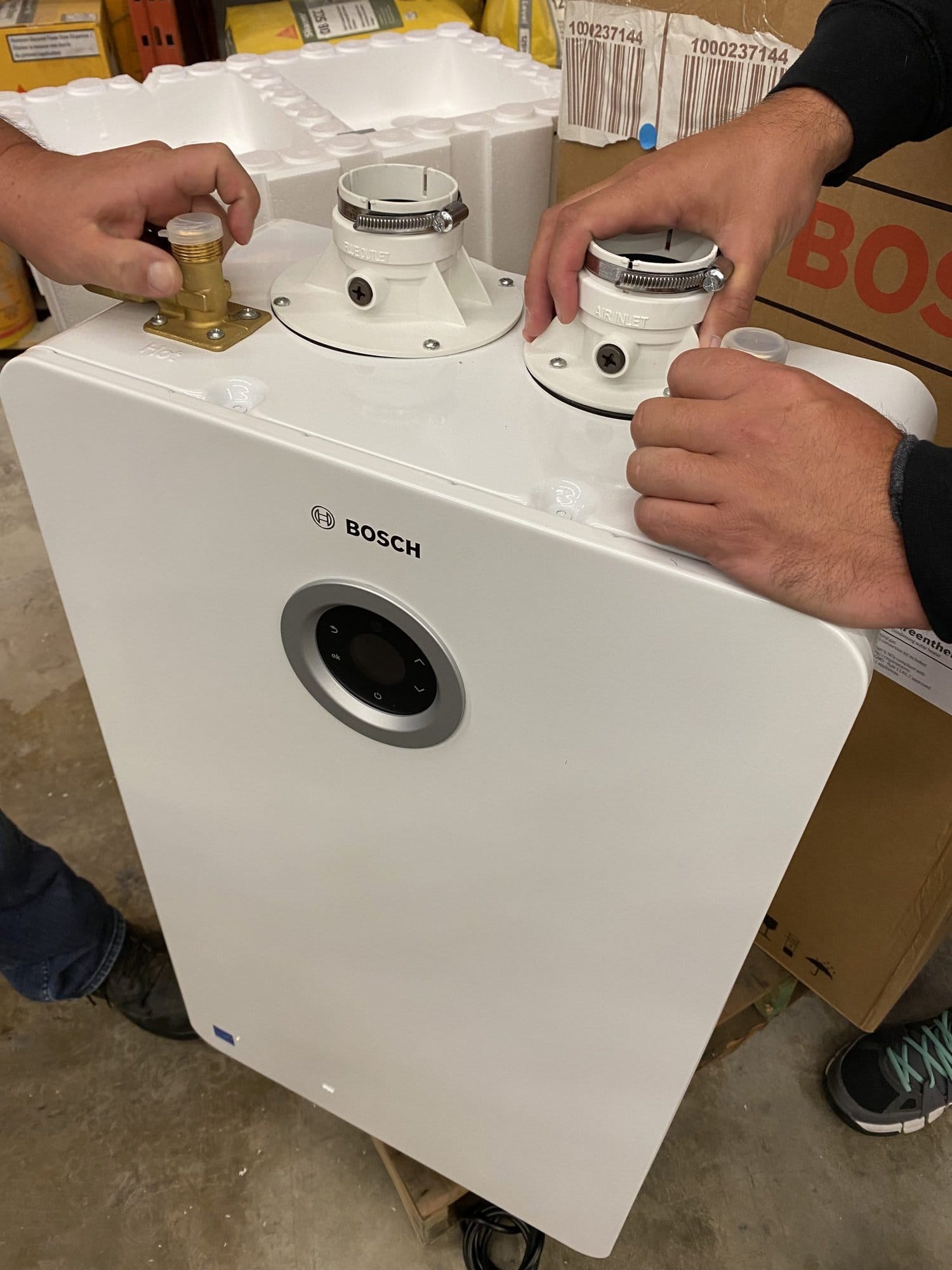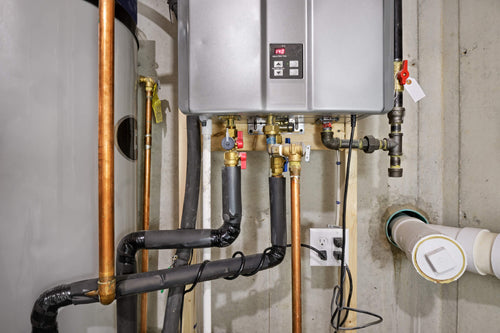Just about every person may have their personal idea involving Why You Should Consider a Tankless Water Heater.

In a world where comfort and performance preponderate, it's no surprise that homeowners are regularly in search of smarter ways to manage their home's power usage and convenience. One technology that has actually continuously acquired popularity is the tankless hot water heater. Yet exactly what makes these systems stand out from the conventional tank-based versions a lot of us grew up with? Allow's dive in and discover the benefits of tankless hot water heater, helping you choose if it's time to make the switch in your home.
Intro
Image this: you step into the shower after a lengthy day, anticipating a relaxing cascade of hot water, only to be welcomed by icy beads because the last individual used it all up. Audio acquainted? Traditional hot water heater save a fixed quantity of warm water, meaning you go to the grace of that storage tank's supply. Tankless systems, on the other hand, warm water as needed. No more going out mid-shower, no more fumbling with timetables simply to ensure warm water is available.
Recognizing Tankless Water Heaters
What Are Tankless Water Heaters?
Tankless water heaters, sometimes referred to as on-demand or instantaneous water heaters, give warm water only as it's needed. Rather than keeping gallons of pre-heated water, these systems kick right into action the moment you switch on the faucet. Water travels through a heat exchanger, heating up in real-time, suggesting you get an undisturbed flow of warm water without the requirement for a huge storage tank sitting idly by.
How Do They Vary from Traditional Systems?
Conventional heaters hold a tank of hot water, using energy to maintain that container at a consistent temperature level. Tankless systems get rid of the standing supply, cutting down on lost energy and the bulky impact of a large cyndrical tube. Basically, you're updating from a "accumulation" frame of mind to a "made-to-order" method.
Typical Kinds Of Tankless Devices
Tankless water heaters normally come in 2 ranges: gas and electrical. Gas models have a tendency to provide higher circulation rates, suitable for larger houses, while electrical designs often offer smaller homes and are usually much easier to mount. Furthermore, some systems are developed for point-of-use (offering one fixture) while others can handle the whole home's warm water needs.
Trick Advantages of Tankless Hot Water Heater
1. Unlimited Warm Water Supply
Ever needed to schedule showers so everybody gets their fair share of hot water? With tankless, that comes to be a thing of the past. As long as the heating system's flow ability isn't surpassed, you can take back-to-back showers without developing into a popsicle.
2. Energy Efficiency and Expense Cost Savings
Say goodbye to heating up a giant storage tank's well worth of water and keeping it toasty all day. Tankless heating systems minimize standby power losses, which can lower utility costs. While the first price could be greater, the long-lasting cost savings often justify the financial investment.
3. Space-Saving Layout
If your home is short on storage, removing the bulky container liberates useful room. Tankless systems are small and can frequently be installed on wall surfaces, hidden in corners, or set up in tight utility storage rooms without grabbing all of the entire room.
4. Longer Lifespan
A well-kept tankless water heater can outlive its tank-based relative. Standard storage tanks may last 10-15 years, while tankless versions can maintain downing along for 20 years or even more, making them a strong investment with time.
5. Improved Water High Quality
Saving water in a tank can often bring about sediment buildup or a slightly "off" taste. With tankless systems, fresh water is heated up instantly, lowering the opportunities of sediment build-up and potentially providing cleaner-tasting water.
Considerations Before Changing
Though the advantages are compelling, it's wise to consider a few factors prior to totally dedicating.
Initial Financial Investment Prices
Tankless heating systems typically feature a greater upfront cost. In between the unit itself and possible installation alterations, the first price may give you sticker shock. Yet keep in mind to view it as a long-lasting financial investment.
Setup Needs
Depending upon your home's framework, you might require additional electric capacity or gas line upgrades. Ensure you recognize the installation needs and talk to a specialist to stay clear of shocks.
Assessing Your Home's Water Usage Patterns
If your family simultaneously uses multiple fixtures with high hot water demand, make certain the system's flow rate fulfills your demands. Understanding your usage patterns assists you select the right size and kind of tankless heating unit.
Maintenance and Treatment Tips
Tankless systems are relatively low upkeep, but they aren't set-it-and-forget-it devices.
Routine Cleaning and Descaling
Difficult water minerals can develop in the heat exchanger, affecting efficiency. Normal descaling (often suggested annually) keeps the device performing at peak performance.
Yearly Expert Inspections
A yearly checkup from a specialist makes sure small problems are captured early. They'll analyze the unit's efficiency, look for leaks, and assist keep optimal effectiveness.
Making Certain Proper Air Flow
For gas models, correct air flow is important to safely expel exhaust gases. Ensure venting systems are clean and correctly installed to avoid any kind of possible security dangers.
Comparing Different Brands and Versions
Not all tankless hot water heater are developed equivalent.
Researching Reputable Producers
Search for trusted brands with a background of producing top quality systems. A reputable manufacturer often supplies far better client assistance and longer guarantees.
Reviewing Evaluations and Individual Feedback
Individual reviews and comments from next-door neighbors or good friends who have gone tankless can offer beneficial insights. In some cases, real-life experiences can be more telling than advertising pamphlets.
Installation: DIY or Specialist?
While some homeowners delight in dealing with jobs themselves, tankless installment could not be the very best time to break out the toolbox.
Advantages and disadvantages of DIY Installation
A do it yourself mount can conserve money, however it includes risks. Incorrect installment can cause ineffectiveness or security issues. If you're handy and have experience, it could be possible-- but wage caution.
When to Call a Professional Plumbing
For a lot of, calling a professional makes sure every little thing's done correctly. An expert plumbing technician recognizes local codes, sizing requirements, and venting parameters, minimizing the danger of mishaps.
Optimizing Performance
You have actually bought a tankless device-- now optimize its effectiveness.
Ideal Temperature Level Setups
Most individuals set their devices in between 120-140 F. Changing the temperature level can improve comfort and savings. Experiment to discover a wonderful area that doesn't lose power.
Coupling With Low-Flow Fixtures
Intend to extend your device's abilities? Think about setting up low-flow showerheads and faucets. They decrease water usage, allowing your tankless system to deliver a stable stream of warm water without straining.
Ecological Impact
Tankless water heaters straighten with greener living objectives.
Decreased Carbon Impact
By using much less power and only heating water as needed, tankless systems can lower your home's carbon footprint, reducing your environmental effect.
Saving Natural Resources
Less power intake and less squandered warm water convert into less natural deposits being made use of, an ecological win-win.
Who Benefits Many from Tankless Heating units?
The charm of tankless heating systems is that they can fit a variety of households.
Big Family Members vs. Solitary Residents
Big family members could like the limitless warm water supply, while solitary passengers value the energy financial savings from not warming an entire container for simply a single person's morning shower.
Homeowners with Minimal Area
If your home is short on square footage, losing the cumbersome tank liberates space for various other basics-- or perhaps just a lot more elbow room.
Eco-Conscious Customers
Going tankless aligns with environmentally friendly values, guaranteeing you're not squandering power or resources.
Future Patterns in Tankless Hot Water Heater
The world of home devices is ever-evolving, and tankless hot water heater are no exception.
Smart Home Integration
Envision adjusting your water heater's temperature level using an app or receiving upkeep signals on your phone. As smart home tech developments, we'll see even more connection and ease.
Advancements in Innovation
R&D is regularly enhancing warm exchangers, making systems a lot more reliable and long lasting. Future designs may be even quieter, much more small, and far better fit for differing environments.
Final thought
Selecting a tankless hot water heater is more than simply upgrading your home's warm water system; it's buying long-lasting comfort, power effectiveness, and a greener lifestyle. By considering your house's water usage, bearing in mind setup requirements, and committing to normal maintenance, you can appreciate a consistent stream of warm water without the baggage of a cumbersome tank. As innovation evolves, you can eagerly anticipate also smarter, more reliable tankless solutions that not only make your life less complicated however also benefit the earth.
5 Benefits of Tankless Water Heaters
Save Valuable Space
Since tankless water heaters do not have a massive 40+ gallon tank of water, they are considerably smaller and can fit in more narrow spaces in your home.
If you are working with limited square footage, a tankless water heater will still provide you with the hot water you need while taking up significantly less space in your home. While the exact size of a tankless water heater varies depending on the brand, some are as small as a carry-on suitcase.
Endless Supply of Hot Water
While a traditional water heater preheats and stores your water in the tank, tankless water heaters do not rely on a reservoir system.
This means that they do not run out of hot water like traditional water heaters since they make hot water as needed. Traditional water heaters need to stop and reheat water when the tank inevitably runs out, but tankless water heaters do not have this issue.
Provide Warm Water On-Demand
As mentioned above, tankless water heaters do not preheat a certain amount of water and then store it in a massive tank to be used later. An advantage of installing a tankless water heater includes water being heated instantly whenever you turn on the faucet.
When you turn on the water, it will travel through a heat exchanger in the unit and be heated with either an electric element or a natural gas burner. Gone are the days of having to ration out your hot water to make sure that you do not run out.
Longer Life Cycle
Not only do tankless water heaters provide an endless supply of hot water for your home whenever you want it, but these units tend to have a longer lifespan than water heaters with tanks.
Tanked water heaters have an average lifespan of around 10 years, as the tank is prone to corrosion, leading to serious issues. In comparison, tankless water heaters can last for around 15 to 20 years with the proper maintenance and tune-ups.
Energy Efficient
Compared to traditional water heaters, tankless water heaters are a more energy-efficient water heating option for your home. Tank water heaters must heat and reheat the water stored in the tank throughout the day, even if you are not home.
This energy use adds up over time, leading to an increase in your energy bills and added strain on your unit. A benefit of buying a tankless water heater includes saving money since it only operates when you turn on the hot water. Since it only heats up as needed, this can decrease your energy bills and save you money in the long run.
https://callrandazzo.com/blog/5-benefits-of-tankless-water-heaters/

As a fervent reader on 5 Benefits of Tankless Water Heaters, I assumed sharing that piece of content was really helpful. Do you know about somebody else who is intrigued by the topic? Please feel free to share it. We thank you for your readership.
Visit Our Site